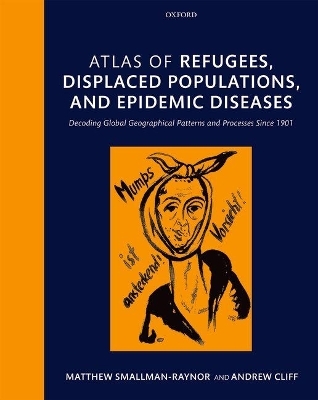
Atlas of refugees, displaced populations, and epidemic diseases
Oxford University Press (Verlag)
978-0-19-967631-6 (ISBN)
- Lieferbar
- Versandkostenfrei
- Auch auf Rechnung
- Artikel merken
Refugees and displaced populations are a highly relevant, controversial topic of the modern socio-political landscape, with images of people fleeing conflicts and natural disasters a regular occurrence in the media. They flee to perceived safe havens, but are often accompanied by sickness, starvation, poor sanitation, close contact and reduced healthcare. Infection frequently spreads among camps, and sometimes, onwards into the local population. Epidemics develop. What are these diseases, and can they be controlled? What are the health consequences for the migrating and resident populations? What might the demographic impact be? The Atlas of refugees, displaced populations, and epidemic diseases examines the globally changing geographical patterns of communicable diseases among refugees and other displaced persons - in flight, in camps, and resettled in local communities - since the beginning of the twentieth century.
The book explores historical and contemporary case studies, including the First World War and its aftermath, the impact of genocides across the twentieth and early twenty-first centuries, Mozambican refugees traversing Central Africa in the late 1980's, the 2010 Haiti earthquake, and the 2014 Ebola virus crisis. The book integrates theory, qualitative and quantitative data, and spatial analysis, locating examples in the context of global demographics and summarising information in an approachable way. Illustrated with over 400 maps and diagrams, case studies are presented in regional and thematic contexts to guide the reader through the displaced populations and communicable diseases over the last 116 years. The discussion covers epidemiological determinants of outbreaks, including overviews of social and political factors that motivate displacement of populations. Important information on epidemic control and the results of these actions is also provided.
The Atlas of refugees, displaced populations, and epidemic diseases is an essential resource for all those interested in public health, epidemiology, demography, ecology, economic history, and the history of medicine. This rich and detailed text is ideal for both specialists and students to deepen their understanding of the topic.
Professor Andrew D. Cliff, European Academy 2002; FBA 1996; Professor of Theoretical Geography, University of Cambridge, since 1997; Pro-Vice-Chancellor since 2004; Fellow, Christ's College, Cambridge, since 1974. Educ: King's Coll. London (BA 1964); Northwestern Univ. (MA 1966); Univ. of Bristol (PhD 1969; DSc 1982); MA Cantab. 1973. FSS 1968. Teaching Asst in Geog., Northwestern Univ., 1964-66; University of Bristol: Res. Associate in Geog., 1968-69; Lectr 1969-72; Lectr in Geog., Univ. of Cambridge, 1973-91; Reader in Theoretical Geog., Univ. of Cambridge, 1991-97. Professor of Theoretical Geog., Univ. of Cambridge, 1997- Present. Professor Matthew R. Smallman-Raynor, Professor of Geography, University of Nottingham, since 2004. Educ: Cambridge University, BA (1988), MA Cantab. (1991), PhD (1991). Res. Associate in Geog., Univ. of Cambridge, 1991-94; Lectr in Geog., Univ. of Exeter, 1994-96; Univ. of Nottingham: Res. Fellow, 1996-98; Lectr in Geog., 1998-2001; Reader in Geog., 2001-4; Professor in Geog., 2004- Present.
Part 1: Introduction
1: Introduction: Forced population displacement and disease
Part 2: Regional Patterns and Processes, 1901-2015
2: Europe at war, 1901-1950
3: Africa
4: South-East Asia and the Western Pacific since 1945
5: The Americas since 1945
6: The Middle East: State formation and refugees
Part 3: Themes, 1901-2015
7: Civil defence and national security: Emergency evacuation and wartime internment
8: Genocide, ethnic cleansing, displacement, and disease
9: Natural disasters
10: Anthropogenic disasters and environmental disruptions
Part 4: Epilogue
11: Epilogue
| Erscheinungsdatum | 02.01.2018 |
|---|---|
| Verlagsort | Oxford |
| Sprache | englisch |
| Maße | 227 x 279 mm |
| Gewicht | 1268 g |
| Themenwelt | Studium ► Querschnittsbereiche ► Epidemiologie / Med. Biometrie |
| Studium ► Querschnittsbereiche ► Prävention / Gesundheitsförderung | |
| Sozialwissenschaften ► Politik / Verwaltung | |
| Sozialwissenschaften ► Soziologie ► Spezielle Soziologien | |
| ISBN-10 | 0-19-967631-3 / 0199676313 |
| ISBN-13 | 978-0-19-967631-6 / 9780199676316 |
| Zustand | Neuware |
| Haben Sie eine Frage zum Produkt? |
aus dem Bereich


